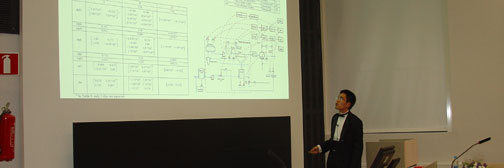| | Year 2005
Teemu LiikalaThe use of fault detection in model predictive control of a refinery process unit
Fault tolerant control (FTC) endeavours to enhance the availability of the plant by intelligently exploiting the redundancies and information in the process control system. This objective is achieved by applying fault accommodation or controller reconfiguration. It may even be necessary to take supervisory measures, changing the high-level objectives governing the control of the process. A fundamental prerequisite for initiating the aforementioned corrective procedures of active FTC is successful execution of fault detection and isolation (FDI). FTC has proven a very beneficial but difficult task for model predictive control (MPC) applications. The corresponding FDI has turned out to be especially troublesome because in closed-loop control the faults are often obscured by the control action itself. On the other hand, MPC’s inherent fault tolerance and its internal models have provided a substantial advantage in formulating fault tolerant MPC schemes.
Methods of FTC and FDI are overviewed in the literature survey part of the thesis. Qualitative, quantitative and process history-based fault detection methods are presented. Additionally, articles covering the principles of MPC and its fault tolerance are studied and reported. Networked control systems and their fault tolerance are discussed.
In the experimental part of the thesis, the focus was on finding a suitable process unit for testing the methods of FTC and FDI. In order to carry out the task, process units at the Naantali oil refinery in Finland were reviewed in collaboration with the site’s personnel. Based on the study a suitable process unit was selected. For the chosen process unit, a dynamic simulator set-up was developed for process simulation purposes and in particular for simulating the typical faults taking place in the unit’s online process analysers. Consequently, an MPC controller was also configured to control the simulated process. Faults are frequent in the unit’s online process analysers and therefore provide an important focus of research. The different impacts of detected and undetected faults on overall control performance are reported in the thesis.
The unquestionable advantage of fault detection was demonstrated by simulating the faults. Upon receiving FDI signals indicating faults, the MPC controller resorts to its internal model predictions, leaving out the prediction update, thus disregarding the faulty feedback measurement from the analyser. Without detection of the faults the controller will accept the failed measurements as healthy, impairing the overall control performance. The thesis shows that with efficient FDI the overall control performance remains good during normal operation of the process despite the faults afflicting the analysers. This underlines the importance of using FTC with FDI in an MPC environment.
Deprecated: strlen(): Passing null to parameter #1 ($string) of type string is deprecated in C:\WWWroot\Root\incs\5_theses\theses_new2010.php on line 248
This info last modified 27 Apr 2024 by Jerri Kämpe-Hellenius
|

